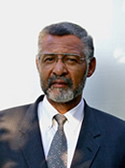Prof. Kennedy J. Reed

Curriculum Vitae
Kennedy Reed is a physicist in the Theory Group in the Physics & Advanced Technologies Directorate at Lawrence Livermore National Laboratory (LLNL). He earned his B.S. at Monmouth College in Illinois, and his Ph.D. at the University of Nebraska. Prior to his employment at LLNL he was a professor of physics at Morehouse College, in Atlanta, GA.
Reed's research has been connected with various aspects of atomic collision theory. His early work at LLNL involved theoretical studies of ion atom collisions, and was connected with LLNL experiments on these collisions. Later he became involved with investigations of atomic processes in high temperature plasmas, and focused primarily on electron collisions with positive ions. His work in this area contributed to new understanding of the role of indirect processes in electron - impact excitation and ionization of highly charged heavy ions. He has over 100 publications on his research.
Reed has been a visiting scientist at the Hahn Meitner Institute in Germany and at University College London in the U.K.. He is a fellow of the American Physical Society, a fellow of the National Society of Black Physicists, a fellow of the American Association for the Advancement of Science, and a member of the Optical Society of America. He has served on review panels for the National Science Foundation, the U.S. Department of Energy, and the National Research Council; and has also served on external advisory boards for research centers at several universities. Dr. Reed has been elected president-designate of the International Union of Pure and Applied Physics (IUPAP).
Kennedy has been very active in national programs that promote minority participation in physics. He was a co-founder of the National Physical Science Consortium - a national coalition of corporations, national laboratories and universities - which provides fellowships for women and minority students pursuing graduate studies in the physical sciences. He has been President of the National Society of Black Physicists, and currently is Chair of the Scholarship Committee for that organization. He has served on the APS Committee on Minorities in Physics; and as Chair of the APS Bouchet Prize Committee. He is the Director the LLNL Research Collaborations Program for Historically Black Colleges and Universities & Other Minority Institutions. (HBCUs & MIs); and he is an Associate Director for Education and Outreach at the NSF Center for Biophotonics Science and Technology at University of California, Davis.
In 1997 and 1999 Reed was a visiting scientist at University Cheikh Anta Diop in Senegal, and at the University of Cape Coast in Ghana under the auspices of the Visiting Scholars Program of the International Center for Theoretical Physics in Trieste. He has presented scientific lectures at universities in a number of other African countries, and has organized international conferences and workshops connected with physics in Africa. He has been Vice Chair of the APS Committee on International Scientific Affairs; a member of the APS Task Force on Research Collaborations with Africa; and is the U.S. representative on the International Union of Pure and Applied Physics (IUPAP) Commission on Physics for Development.
Reed has organized and conducted extensive U.S. visits for African physicists. These visits have included formal meetings and presentations at universities and laboratories throughout the U.S., as well as some high level meetings in Washington, DC with representatives from agencies such as NSF, USAID, AAS, and NRC. Some of these visits resulted in official agreements for student and faculty exchanges between African universities and universities in the U.S..
In 2003, Reed received the American Physical Society's John Wheatley Award. He was cited for his work to promote physics research and education in Africa.